- Clone
- 29-2L17 (See other available formats)
- Regulatory Status
- RUO
- Other Names
- CD196, BN-1, CKR-L3, DRY6, KY411, STRL22
- Isotype
- Armenian Hamster IgG
- Ave. Rating
- Submit a Review
- Product Citations
- publications
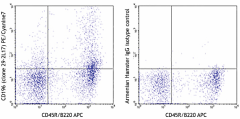
-

C57BL/6 mouse splenocytes stained with CD45R/B220 (RA3-6B2) APC and CD196 (clone 29-2L17) PE/Cyanine7 (right) or rat IgG2a PE/Cyanine7 isotype control (right)
| Cat # | Size | Price | Quantity Check Availability | Save | ||
|---|---|---|---|---|---|---|
| 129815 | 25 µg | £121 | ||||
| 129816 | 100 µg | £262 | ||||
CCR6 is a G-protein linked chemokine receptor which binds the chemokine CCL20/MIP-3a. It is expressed on B lymphocytes and certain subsets of dendritic cells and T cells. CCR6 is reported to be involved in mucosal immune response and lymphocyte migration and homeostasis.
Product DetailsProduct Details
- Verified Reactivity
- Mouse
- Antibody Type
- Monoclonal
- Host Species
- Armenian Hamster
- Immunogen
- N-terminal peptide (aa. 2-38) of mouse CCR6 fused with GST
- Formulation
- Phosphate-buffered solution, pH 7.2, containing 0.09% sodium azide.
- Preparation
- The antibody was purified by affinity chromatography, and conjugated with PE/Cyanine7 under optimal conditions.
- Concentration
- 0.2 mg/ml
- Storage & Handling
- The antibody solution should be stored undiluted between 2°C and 8°C, and protected from prolonged exposure to light. Do not freeze.
- Application
-
FC - Quality tested
- Recommended Usage
-
Each lot of this antibody is quality control tested by immunofluorescent staining with flow cytometric analysis. For flow cytometric staining, the suggested use of this reagent is ≤ 1.0 µg per 106 cells in 100 µl volume. It is recommended that the reagent be titrated for optimal performance for each application.
- Excitation Laser
-
Blue Laser (488 nm)
Green Laser (532 nm)/Yellow-Green Laser (561 nm)
- Product Citations
-
- RRID
-
AB_1877244 (BioLegend Cat. No. 129815)
AB_2072798 (BioLegend Cat. No. 129816)
Antigen Details
- Structure
- G-protein linked, seven transmembrane, domain-spanning chemokine receptor; 367 amino acids long and about 75% homology with human CCR6
- Distribution
-
Expressed on spleen B cells, immature splenic dendritic cells in Peyer's patches, and some T cell subset
- Function
- Important in regulating mucosal immune response
- Ligand/Receptor
- CCL20/MIP-3a
- Cell Type
- B cells, Dendritic cells, T cells
- Biology Area
- Immunology
- Molecular Family
- CD Molecules, Cytokine/Chemokine Receptors, GPCR
- Antigen References
-
1. Rossi D, et al. 1997. J. Immunol. 158:1033.
2. Lukacs N, et al. 2001. J. Exp. Med. 194:551.
3. Cook DN, et al. 2000. Immunity 12:495 - Gene ID
- 12458 View all products for this Gene ID
- UniProt
- View information about CD196 on UniProt.org
Related FAQs
- Does staining at room temperature or even at 37°C help for checking chemokine receptors expression?
-
Due to continuous recycling of many chemokine receptors, it may be worthwhile to consider staining at room temperature or at 37°C if the staining at lower temperature (which can potentially reduce receptor turnover) is not optimal.
Other Formats
View All CD196 Reagents Request Custom Conjugation| Description | Clone | Applications |
|---|---|---|
| Purified anti-mouse CD196 (CCR6) | 29-2L17 | FC |
| PE anti-mouse CD196 (CCR6) | 29-2L17 | FC |
| Alexa Fluor® 647 anti-mouse CD196 (CCR6) | 29-2L17 | FC |
| PerCP/Cyanine5.5 anti-mouse CD196 (CCR6) | 29-2L17 | FC |
| APC anti-mouse CD196 (CCR6) | 29-2L17 | FC |
| PE/Cyanine7 anti-mouse CD196 (CCR6) | 29-2L17 | FC |
| Brilliant Violet 421™ anti-mouse CD196 (CCR6) | 29-2L17 | FC |
| Brilliant Violet 605™ anti-mouse CD196 (CCR6) | 29-2L17 | FC |
| PE/Dazzle™ 594 anti-mouse CD196 (CCR6) | 29-2L17 | FC |
| Brilliant Violet 785™ anti-mouse CD196 (CCR6) | 29-2L17 | FC |
| TotalSeq™-A0225 anti-mouse CD196 (CCR6) | 29-2L17 | PG |
| TotalSeq™-B0225 anti-mouse CD196 (CCR6) | 29-2L17 | PG |
| TotalSeq™-C0225 anti-mouse CD196 (CCR6) | 29-2L17 | PG |
| PE/Fire™ 640 anti-mouse CD196 (CCR6) | 29-2L17 | FC |
| PE/Fire™ 810 anti-mouse CD196 (CCR6) | 29-2L17 | FC |
| PE/Fire™ 700 anti-mouse CD196 (CCR6) | 29-2L17 | FC |
| PE/Cyanine5 anti-mouse CD196 (CCR6) | 29-2L17 | FC |
| Spark Red™ 718 anti-mouse CD196 (CCR6) (Flexi-Fluor™) | 29-2L17 | FC |
| Spark PLUS B550™ anti-mouse CD196 (CCR6) | 29-2L17 | FC |
Customers Also Purchased
Compare Data Across All Formats
This data display is provided for general comparisons between formats.
Your actual data may vary due to variations in samples, target cells, instruments and their settings, staining conditions, and other factors.
If you need assistance with selecting the best format contact our expert technical support team.
-
Purified anti-mouse CD196 (CCR6)
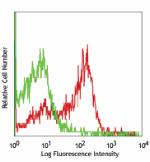
C57BL/6 splenocytes stained with purified 29-2L17, followed ... -
PE anti-mouse CD196 (CCR6)
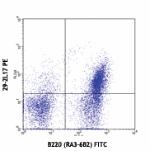
C57BL/6 splenocytes stained RA3-6B2 (B220) FITC and 29-2L17 ... -
Alexa Fluor® 647 anti-mouse CD196 (CCR6)
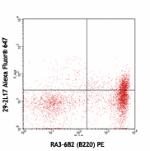
C57BL/6 splenocytes stained with RA3-6B2 (B220) PE and 29-2L... -
PerCP/Cyanine5.5 anti-mouse CD196 (CCR6)

C57BL/6 splenocytes stained with CD45R/B220 (RA3-6B2) APC an... -
APC anti-mouse CD196 (CCR6)
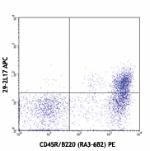
C57BL/6 splenocytes stained with 29-2L17 APC and CD45R/B220 ... 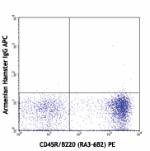
C57BL/6 splenocytes stained with Armenian Hamster IgG isotyp... -
PE/Cyanine7 anti-mouse CD196 (CCR6)

C57BL/6 mouse splenocytes stained with CD45R/B220 (RA3-6B2) ... -
Brilliant Violet 421™ anti-mouse CD196 (CCR6)
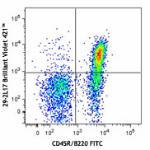
C57BL/6 splenocytes were stained with CD45R/B220 FITC and CD... 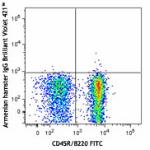
-
Brilliant Violet 605™ anti-mouse CD196 (CCR6)
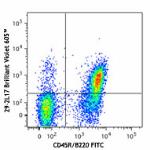
C57BL/6 mouse splenocytes were stained with CD45R/B220 FITC ... 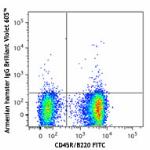
-
PE/Dazzle™ 594 anti-mouse CD196 (CCR6)
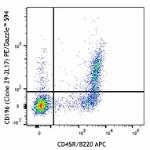
C57BL/6 splenocytes stained with CD45R/B220 APC and CD196 (C... 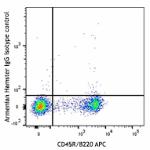
-
Brilliant Violet 785™ anti-mouse CD196 (CCR6)
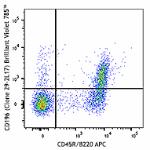
C57BL/6 splenocytes stained with CD45R/B220 APC and CD196 (c... 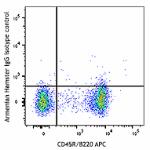
-
TotalSeq™-A0225 anti-mouse CD196 (CCR6)
-
TotalSeq™-B0225 anti-mouse CD196 (CCR6)
-
TotalSeq™-C0225 anti-mouse CD196 (CCR6)
-
PE/Fire™ 640 anti-mouse CD196 (CCR6)

C57BL/6 splenocytes were stained with anti-mouse/human CD45R... -
PE/Fire™ 810 anti-mouse CD196 (CCR6)

C57BL/6 splenocytes were stained with anti-mouse CD45R/B220 ... -
PE/Fire™ 700 anti-mouse CD196 (CCR6)

C57BL/6 splenocytes stained with anti-human/mouse CD45R/B220... -
PE/Cyanine5 anti-mouse CD196 (CCR6)

C57BL/6 mouse splenocytes were stained with anti-mouse/human... -
Spark Red™ 718 anti-mouse CD196 (CCR6) (Flexi-Fluor™)
-
Spark PLUS B550™ anti-mouse CD196 (CCR6)

C57BL/6 splenocytes stained with anti-mouse CD45R/B220 (clon...
 Login / Register
Login / Register 










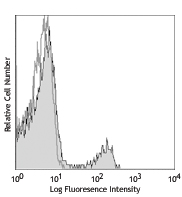
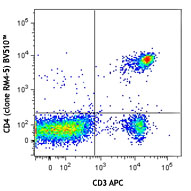
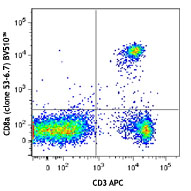
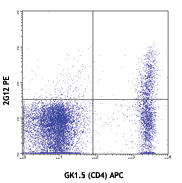



Follow Us